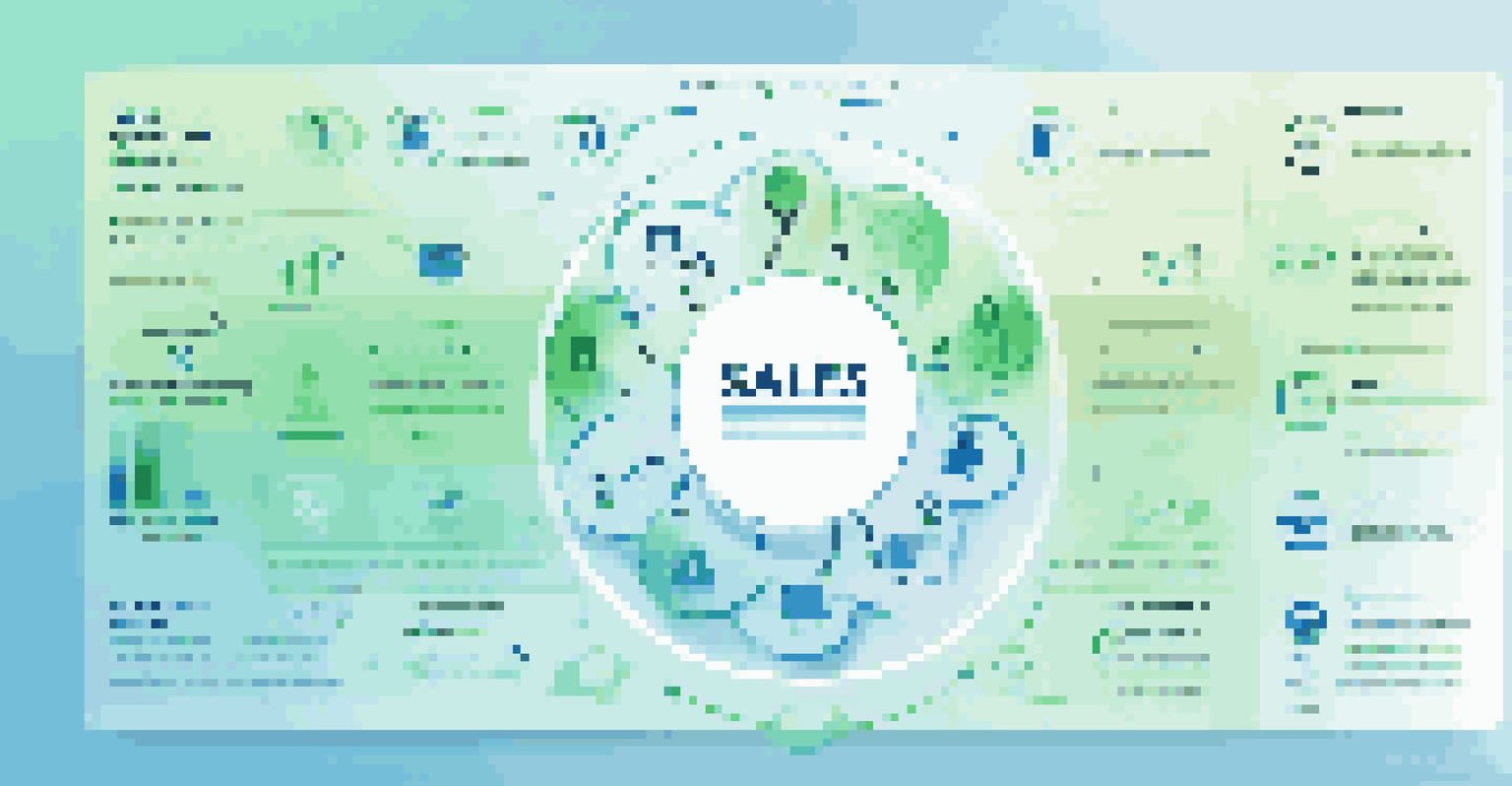Using CRM to Drive Sales and Improve Revenue Growth

Understanding CRM: The Foundation of Sales Success
Customer Relationship Management (CRM) systems are tools designed to help businesses manage their interactions with current and potential customers. They streamline processes by centralizing customer data, making it easier to access and analyze. This foundational understanding of CRM is crucial, as it sets the stage for how these systems can significantly impact sales strategies.
The purpose of a business is to create a customer who creates customers.
Imagine a busy restaurant that uses a reservation system to manage tables. Just like that, CRM systems help businesses keep track of leads, sales, and customer interactions, ensuring nothing slips through the cracks. With this organized approach, sales teams can focus more on building relationships rather than getting lost in paperwork.
Ultimately, a clear understanding of CRM enables businesses to leverage these tools effectively, allowing for targeted marketing efforts and improved customer engagement. This sets the groundwork for driving sales and fostering long-term growth.
Enhancing Customer Insights for Targeted Sales Strategies
One of the most significant advantages of using a CRM is the wealth of customer insights it provides. By analyzing customer data, businesses can identify buying patterns, preferences, and pain points. This information allows sales teams to tailor their approaches, making their pitches more relevant and appealing.

Think of it this way: if you were shopping for a gift, you'd appreciate a store that remembers your preferences and suggests options tailored to your taste. Similarly, a CRM helps salespeople connect with customers on a personal level, fostering stronger relationships and increasing the chances of closing deals.
CRM Enhances Sales Efficiency
CRM systems streamline sales processes, allowing teams to focus on relationship building and closing deals.
In essence, by leveraging customer insights from CRM systems, businesses can create targeted sales strategies that resonate with their audience, ultimately leading to higher conversion rates and increased revenue.
Streamlining Sales Processes for Increased Efficiency
CRM systems are designed to streamline sales processes, making it easier for teams to track leads and manage their sales pipelines. By automating routine tasks—like follow-up emails and appointment scheduling—salespeople can focus on what really matters: building relationships and closing deals. This efficiency not only saves time but also boosts productivity.
In the world of business, the one who builds the best relationships wins.
For instance, think about how a well-oiled machine operates seamlessly to produce high-quality products. In the same way, a CRM helps sales teams operate efficiently, ensuring that each team member knows their responsibilities and deadlines. This clarity leads to fewer mistakes and a smoother sales process overall.
As a result, by streamlining sales processes, businesses can allocate their resources more effectively, allowing for faster response times and ultimately driving revenue growth.
Improving Collaboration Among Sales and Marketing Teams
Collaboration between sales and marketing teams is essential for driving revenue growth, and CRM systems facilitate this by providing a shared platform for communication. When both teams have access to the same customer data, they can work together more effectively to create aligned strategies. This results in a unified approach to reaching potential customers.
Imagine a sports team where players share the same playbook, ensuring everyone is on the same page. Similarly, a CRM acts as this playbook, allowing sales and marketing teams to coordinate their efforts and share valuable insights. This synergy not only enhances campaign effectiveness but also improves customer experiences.
Customer Insights Drive Strategy
Leveraging customer data from CRM enables businesses to create targeted sales strategies that resonate with their audience.
Ultimately, improved collaboration through CRM leads to a more cohesive strategy, which can significantly impact overall sales performance and revenue growth.
Tracking Performance Metrics to Optimize Sales Efforts
A crucial feature of CRM systems is their ability to track performance metrics, providing valuable insights into sales activities. By analyzing data like conversion rates, average deal size, and sales cycle length, businesses can gain a clearer picture of their sales performance. This allows teams to identify areas for improvement and adjust their strategies accordingly.
Consider a chef who tastes their dish and adjusts the seasoning based on feedback. Similarly, sales teams can refine their approach by constantly monitoring their performance metrics. This iterative process ensures that they are always striving for better results.
In essence, tracking performance metrics through CRM systems empowers businesses to optimize their sales efforts, leading to increased efficiency and higher revenue growth.
Automating Sales Tasks to Focus on Relationship Building
Automation is one of the standout features of modern CRM systems, allowing sales teams to focus on relationship-building rather than getting bogged down in administrative tasks. By automating repetitive tasks like data entry, follow-ups, and report generation, salespeople can dedicate more time to engaging with customers and nurturing leads.
Think of it like having a personal assistant who manages your schedule and reminders, freeing you up to focus on important interactions. Automation in CRM serves a similar purpose, ensuring that sales teams can prioritize meaningful customer interactions without sacrificing efficiency.
Collaboration Boosts Revenue Growth
Improved collaboration between sales and marketing teams through CRM leads to a more cohesive strategy and increased sales performance.
As a result, by embracing automation, businesses can enhance their sales effectiveness, ultimately leading to improved revenue growth.
Leveraging CRM for Enhanced Customer Retention
While attracting new customers is essential for growth, retaining existing customers is equally important. CRM systems play a vital role in enhancing customer retention by providing tools for ongoing engagement and support. By utilizing customer data, businesses can identify opportunities for upselling and cross-selling, ensuring that existing customers continue to find value in their products or services.
Imagine a loyal customer who feels appreciated and understood by a brand. This sense of loyalty often translates to repeat purchases and positive word-of-mouth referrals. A CRM helps businesses cultivate these relationships by facilitating personalized communication and timely follow-ups.

In essence, leveraging CRM for customer retention not only strengthens relationships but also contributes significantly to long-term revenue growth.
Choosing the Right CRM to Maximize Sales Potential
Selecting the right CRM system is crucial for reaping its benefits in driving sales and improving revenue growth. With various options available, businesses must consider their unique needs, budget, and the specific features that will best serve their sales teams. A well-chosen CRM can be a game-changer, while the wrong one can lead to frustration and wasted resources.
Think of it like choosing the right tool for a job—using a hammer to drive in screws just doesn’t work. Similarly, a CRM needs to align with a company's sales processes to be effective. Factors like user-friendliness, integration capabilities, and customization options should all play a role in the decision-making process.
Ultimately, by carefully selecting the right CRM, businesses can maximize their sales potential, leading to improved efficiency and significant revenue growth.